Released: 25th October 1999
Writers: Mike Stock / Matt Aitken / Steve Crosby
Peak position: #29
Chart run: 29-44-57-72
The arrival of Scooch saw Mike Stock and Matt Aitken attempt to create a pop group that could rival Pete Waterman’s success with Steps. And it truly was a testament to how the legendary songwriting and production trio were still on the same page, even though they were no longer working together.

Although it often came across that Scooch were a cynical attempt to cash-in on Steps, auditions for the group started back in 1997, long before Pete Waterman had realised his vision of creating “ABBA on speed”. Among those that tried out for the group included Heidi Range, who was turned down when it transpired that she was only 14 years old, not 16 as she had claimed. Instead, it was Natalie Powers, Caroline Barnes, David Ducasse and Russ Spencer that made the final cut. However, it wasn’t until late-1999 that Scooch were finally presented to the general public on Live & Kicking.

The story goes that they appeared in a ‘Battle of the Bands’ contest against a group called Glitterbug in a bid to determine whose single should be released. And there’s no disputing that’s what happened, except this was the Saturday before When My Baby hit the shops. This means either Scooch’s label had fronted up the cash to create and distribute a single, knowing there was a 50% chance it would get pulled at the eleventh hour (which isn’t outside the realms of possibility given how the industry was operating at this time). Or the release was going to go ahead regardless, and this was merely a way of trying to generate some audience investment and goodwill towards Scooch ahead of their launch.
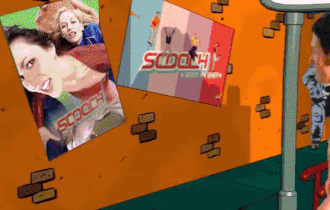
With the backdrop of a SAW rivalry, comparisons with Steps were inevitable. But perhaps the most striking parallel is how it soon transpired that When My Baby – much like 5, 6, 7, 8 – was a somewhat misleading debut single, and so is perhaps easier to appraise of its own merit rather than in the context of Scooch’s career as a whole. There’s not a trace of melancholic disco heartbreak to be found here. Instead, the song is a buoyant celebration of love, delivered by a series of uncomplicated rhyming structures: “You put the colour in my life, when everything was black and white, you said that we were meant to be, you just can’t fight the chemistry”. When My Baby is brimming with such exuberant, bouncy energy that there’s even a boing-boing sound effect employed liberally throughout.
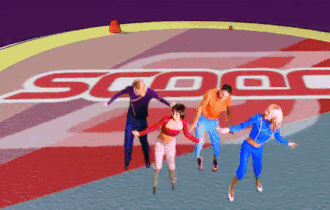
The track firmly compensates for the lack of profundity in its lyrics by exuding pure joy from start to finish. There’s a nifty double-chorus thrown in, which switches from punctuated syllables: “And my heart just skips a beat, and I lose myself completely, from my head down to my feet, when my baby dances with me” into dreamy harmonies: “Heart just skips a beat…lose myself completely…head down to my feet (oh, when my baby)…baby dances with me”. As much as When My Baby presents itself in a functionally simple way – perhaps overly so considering the competition – this seems entirely intentional. In that respect, it’s difficult to argue that the song achieves what it sets out to.
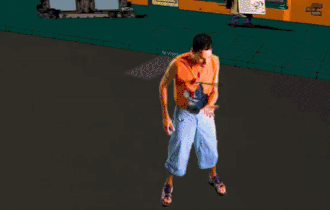
Although When My Baby doesn’t give much away about Scooch’s dynamic – the vocals on their debut album are far more evenly split than was evident from the singles – one thing made abundantly clear is what an asset the group had in Natalie Powers as their lead singer. There is just something about her voice: the little riffs she finds within the song (“You put the heart into my sou-oh-oul”); the power in the: “Oh, when my baby” ad-libs; the way she moves effortlessly from a lower range to a higher range within the same line. When My Baby is not a bad track by any stretch, but it does come perilously close to portraying itself as disposable pop music. However, there is absolutely nothing throwaway about Natalie Powers’ voice, and the whole thing feels far more compelling with her at the helm than it might otherwise have.
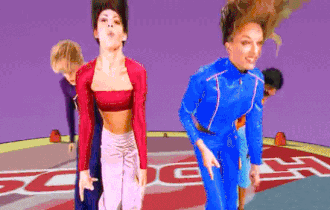
In hindsight, When My Baby works far better when heard and not seen, as the part-animated music video is arguably what undermines Scooch. Not so much in terms of quality, since some of the comic-book rendered visuals which the group are transplanted into are actually pretty good. It’s just that the concept – battling spy-camera aliens – along with the primary colour aesthetic and exaggerated facial expressions, all end up feeling a bit too CBBC/CITV. If that was the market Scooch were to be aimed at, then it would’ve been fine because they throw themselves into it with gusto. But it wasn’t. So, knowing how their image would subsequently evolve to become much more cohesive, it’s hard not to look at When My Baby and feel that – in visual terms, at least – it’s completely disconnected from the rest of the album campaign.

Sometimes, record label strategies make no sense, and this is one of those cases. Releasing When My Baby onthe same date as Steps’ second album Steptacular – which debuted at #1 – inevitably meant that only one boy/girl group was getting all the attention that week. And with S Club 7 also having just released their debut, 7, this particular sub-genre of pop music was just too condensed to accommodate the arrival of yet another act. As a result, Scooch entered the singles chart at #29, which by ‘90s standards was pretty disastrous (and doesn’t reflect well on the dwindling ratings of Live & Kicking, either). Yet, it would be hard to argue the song deserved much more because of the fundamental gulf in quality when comparing the amateurish charm of Mike Stock and Matt Aitken’s work with the high bar that Pete Waterman had set in this domain.
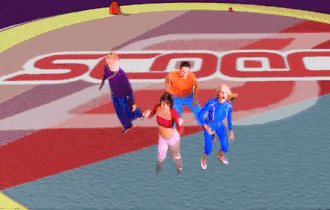
Perhaps the most ironic thing about When My Baby is that it did house what could have been the perfect debut single for Scooch. Tucked on the B-side (and later included on their debut album) was a little track called Syncopated Rhythm. It’s a brilliantly dramatic uptempo, and that in itself would have served the group well. But quite unexpectedly, the song also became a breakout sensation on the line-dancing circuit and is still used widely in competitions today. You have to marvel, really, at the fact that whether they intended to or not, Mike Stock, Matt Aitken and Pete Waterman’s visions were so astutely aligned; because while 5, 6, 7, 8 was overtly designed to jump on that bandwagon, Syncopated Rhythm isn’t. However, it just so happens to work – apparently very well – within that context. Scooch even made the cover of Linedancer Magazine, such was their popularity in that domain. This all helped raise their profile and generate some positive buzz, even in the unlikeliest of circumstances. Thus, you have to wonder what sort of legacy it might have had for Scooch as their debut single proper.

So, maybe this wasn’t the best start. However, the silver lining with When My Baby is that it’s plain to see what could be improved. Everything here was fixable. Put simply, Steps would never have recorded this song. Therefore, Scooch just needed to find a follow-up single that matched – if not surpassed – the standard their rivals were working to. And that is precisely what they did.



